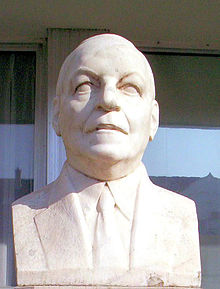- Die Csárdásfürstin
-
Emmerich Kálmán  Operettas
Operettas- The Gay Hussars (1908)
- Az obsitos (1910)
- Der Zigeunerprimas (1912)
- Zsuzsi kisasszony (1915)
- Die Csárdásfürstin (1915)
- Die Bajadere (1921)
- Gräfin Mariza (1924)
- Die Zirkusprinzessin (1926)
- Die Herzogin von Chicago (1928)
- Das Veilchen vom Montmartre (1930)
- Kaiserin Josephine (1936)
- Marinka (1945)
- Arizona Lady (1954)
Die Csárdásfürstin or A Csárdáskirálynő (literally The Csárdás Princess; translated into English as The Riviera Girl and The Gipsy Princess) is an operetta in 3 acts by Hungarian composer Emmerich Kalman, libretto by Leo Stein and B. Jenbach. It premiered in Vienna at the Johann Strauss Theater, 17 November 1915. Numerous film versions and recordings have been made. The operetta is widely beloved in Hungary, Austria, Germany, all of Europe and particularly in former Soviet Union, where it had been adapted into a hugely popular film.[1] It is arguably Kálmán's most successful work.
Contents
Roles
Role Voice type Premiere Cast, November 17, 1915
(Conductor: - )Sylva Varescu soprano Mitzi Günther Edwin Ronald tenor/baritone Karl Bachmann Countess Stasi soprano Susanne Bachrich Count Boni Káncsiánu tenor Josef König Feri von Kerekes bass Antal Nyárai Anhilte contralto Gusti Macha Leopold Maria bass Oberleutnant von Rohnsdorff bass An American bass Synopsis
Mittel-European Aristocracy is decaying shortly before the outbreak of World War I. In Act I, Silva Varescu, a self-sufficient and professionally-successful cabaret performer from Budapest,is about to embark on a tour of America. Three of her aristocratic "Stage Door Johnnies", named Edwin, Feri and Boni, prefer her to stay. Edwin,unaware that his parents have already arranged a marriage for him back home in Vienna, orders a notary to prepare a promissory note of his expected marriage to Silva within ten weeks. Silva then leaves on her American tour, and Edwin leaves for peacetime military duty. Act II is set just at the time this promissory note is about to expire. Silva visits Edwin's Palace in Vienna, pretending to have married Boni as her entree into his family's society. Edwin is about to be engaged to Stasi, who does not care for him and wishes only an arranged marriage. Boni falls in love with Stasi and Edwin regrets not keeping his promise to Silva sooner. However, Edwin makes the faux pas of informing Silva that his parents would accept Silva ONLY if she pretends to have been divorced from Boni and therefore already entered society via an earlier marriage. Edwin's father separately informs Silva that if she marries Edwin without first having achieved noble rank through some other route, her role in society could be merely that of a GYPSY PRINCESS should she go through with the marriage, Silva realizes that she is better than them and has a brighter future than them. She purposefully embarrasses Edwin and his father, turning her back on them and leaving in the presence of their assembled friends. Act III is set in a Viennese hotel to which Feri has accompanied the cabaret troupe from Budapest, who is about to sail on another American tour with Sylva. As everyone is shows up and recognizes each other, Feri recognizes Edwin's mother as a retired cabaret singer from Budapest whose star once shown prior to Sylva's time. Not realizing that those aristocrats staying behind will soon suffer almost complete decimation during the escalation of the war effort in Austria and Hungary following the assassination of the Crown Prince, Edwin's mother joins the two couples, Sylva/Edwin and Boni/Stasi, all unwittingly heading to safety on this American tour. The curtain falls.[citation needed]
Selected recordings
- Anna Moffo (Sylva), René Kollo (Edwin), Dagmar Koller (Countess Stasi), Sándor Németh (Baron Káncsiánu), László Mensáros (Kerekes) - Symphonieorchester Graunke, Bert Grund - Eurodisc (1972)
References
http://www.kino-teatr.ru/kino/movie/sov/6432/annot/
External links
Categories:- Operas by Emmerich Kálmán
- German-language operettas
- 1915 operas
- Operas set in Hungary
- Hungarian music
Wikimedia Foundation. 2010.

